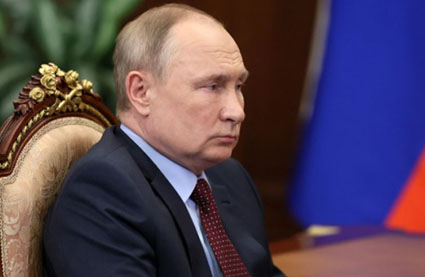by WorldTribune Staff, March 20, 2022
If the powers that be chose to learn from the past instead of rehashing it, Vladimir Putin would not only be defeated but deterred in the future, columnist and historian Victor Davis Hanson noted.
In a March 16 op-ed for American Greatness, Hanson clarified the context of the Russia-Ukraine conflict and skewered claims that varying perspectives on its cause should not be tolerated:

- Reassuring an enemy what one will not do ensures that the enemy will do just that and more. Unpredictability and occasional enigmatic silence bolster deterrence. But Joe Biden’s predictable reassurance to Putin that he will show restraint means Putin likely will not.
- Europe, NATO members, and Germany in particular have de facto admitted that their past decades of shutting down nuclear plants, coal mines, and oil and gas fields have left Europe at the mercy of Russia. They are admitting that their critics, the United States in particular, were right, and they were dangerously wrong in empowering Putin.
- Americans are finally digesting just how destructive the humiliating flight from Afghanistan was. The catastrophe signaled to Russia, China, North Korea, and Iran that Western deterrence had died.
- The Ukraine war did not cause inflation and record gas prices. Both were already spiking by early February 2022. The cause was the Biden Administration’s year-long radical expansion of the money supply at a time of post-COVID, pent-up consumer demand. It foolishly continued de facto zero-interest rates. Its generous COVID subsidies for the unemployed discouraged a return to work, while slashing U.S. oil and gas production and pipelines.
- Putin did not invade during the Trump tenure — although he had been more aggressive under previous American leadership with his prior attacks on Georgia, Ukraine, and Crimea. Russia stayed still when oil prices were low, fuel supplies in the West were plentiful, and the United States was confident. When the United States was neither bogged down in optional military interventions nor led by a president predictably accommodating to Russian aggressions, Russia stayed quiet. Putin took note of increased NATO and U.S. defense spending. He feared low global oil prices and record American oil and gas production. He was wary after unpredictable American strikes against enemies like ISIS, Abu al-Baghdadi, and the Iranian General Qasem Soleimani.
- It is not “escalation” to send arms to Ukraine. The Russians far more aggressively supplied the North Koreans and North Vietnamese in their wars against America, without spreading the war globally.
- Putin may never fully absorb Ukraine as long as it can easily be supplied across its borders by four NATO countries. The United States deadlocked in the Korean War, lost the Vietnam War, was stalled in Iraq, and fled Afghanistan in part because its enemies were easily supplied by nearby border friends on the assumption the United States could not strike such abettors.
- It is not “un-American” to point out that prior American appeasement under the Obama and the Biden Administrations explains not why Putin wished to go into Ukraine, but why he felt he could. It is not “treasonous” to say Ukraine and the United States previously should have stayed out of each other’s domestic affairs and politics — but still do not excuse Putin’s savage aggression.
About . . . . Intelligence . . . . Membership
